MGN410 Case Study: Employment Relations and Indigenous Strategy at QUT
VerifiedAdded on 2022/11/14
|9
|2464
|371
Case Study
AI Summary
This case study analyzes QUT's Indigenous Employment Strategy, focusing on the university's commitment to increasing employment opportunities and community engagement for Aboriginal and Torres Strait Islander peoples. The assignment explores the strategy's aims, including increasing the representation of Indigenous staff, enhancing understanding of Indigenous perspectives, and fostering greater involvement in decision-making. It references relevant literature and strategies, such as the Indigenous Employment Strategy and Action Plan, to highlight the importance of addressing the social and emotional wellbeing of Indigenous people in the workplace. The case study also delves into the impact of factors like stress, trauma, and cultural considerations on Indigenous employees, as well as the role of ethical codes of conduct and governmental interventions. It also highlights the various programs implemented by QUT, such as workshops, traineeships, and career mentoring programs, designed to support the professional development and retention of Indigenous staff, while emphasizing the importance of data protection and privacy. The analysis concludes by emphasizing the significance of continuous evaluation, collaboration, and a supportive work environment in promoting the success and wellbeing of Indigenous communities within the university setting.
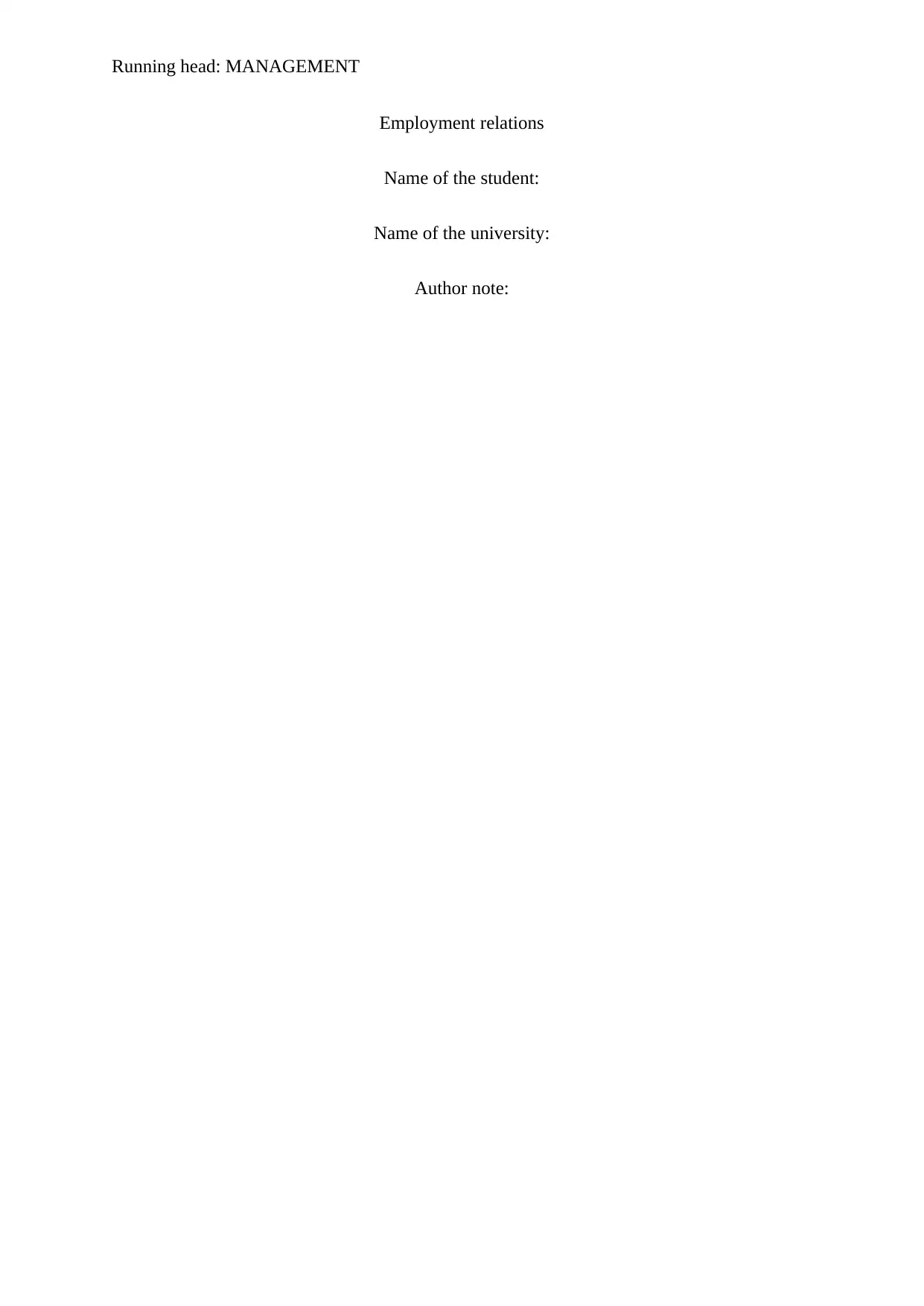
Running head: MANAGEMENT
Employment relations
Name of the student:
Name of the university:
Author note:
Employment relations
Name of the student:
Name of the university:
Author note:
Paraphrase This Document
Need a fresh take? Get an instant paraphrase of this document with our AI Paraphraser
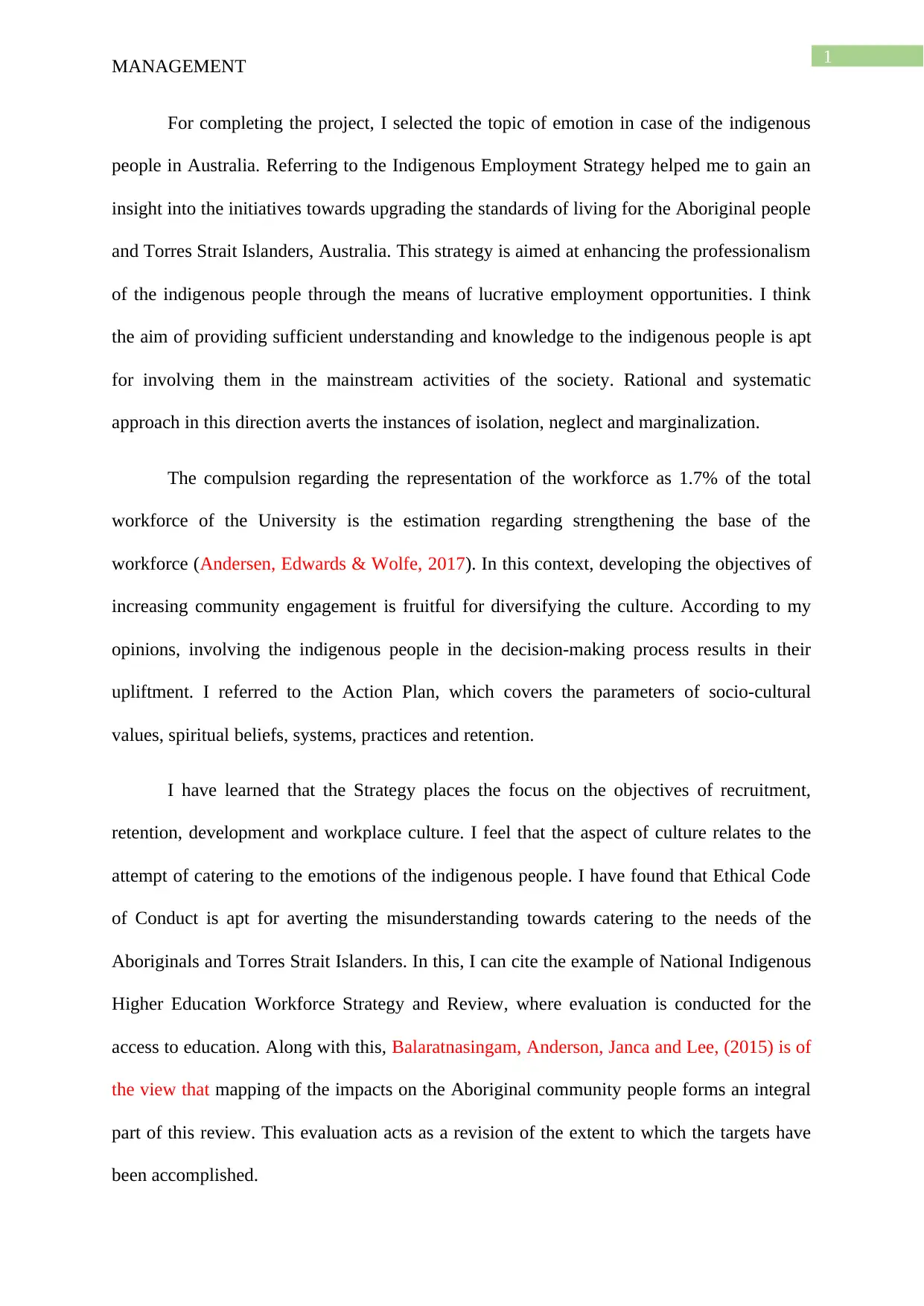
1
MANAGEMENT
For completing the project, I selected the topic of emotion in case of the indigenous
people in Australia. Referring to the Indigenous Employment Strategy helped me to gain an
insight into the initiatives towards upgrading the standards of living for the Aboriginal people
and Torres Strait Islanders, Australia. This strategy is aimed at enhancing the professionalism
of the indigenous people through the means of lucrative employment opportunities. I think
the aim of providing sufficient understanding and knowledge to the indigenous people is apt
for involving them in the mainstream activities of the society. Rational and systematic
approach in this direction averts the instances of isolation, neglect and marginalization.
The compulsion regarding the representation of the workforce as 1.7% of the total
workforce of the University is the estimation regarding strengthening the base of the
workforce (Andersen, Edwards & Wolfe, 2017). In this context, developing the objectives of
increasing community engagement is fruitful for diversifying the culture. According to my
opinions, involving the indigenous people in the decision-making process results in their
upliftment. I referred to the Action Plan, which covers the parameters of socio-cultural
values, spiritual beliefs, systems, practices and retention.
I have learned that the Strategy places the focus on the objectives of recruitment,
retention, development and workplace culture. I feel that the aspect of culture relates to the
attempt of catering to the emotions of the indigenous people. I have found that Ethical Code
of Conduct is apt for averting the misunderstanding towards catering to the needs of the
Aboriginals and Torres Strait Islanders. In this, I can cite the example of National Indigenous
Higher Education Workforce Strategy and Review, where evaluation is conducted for the
access to education. Along with this, Balaratnasingam, Anderson, Janca and Lee, (2015) is of
the view that mapping of the impacts on the Aboriginal community people forms an integral
part of this review. This evaluation acts as a revision of the extent to which the targets have
been accomplished.
MANAGEMENT
For completing the project, I selected the topic of emotion in case of the indigenous
people in Australia. Referring to the Indigenous Employment Strategy helped me to gain an
insight into the initiatives towards upgrading the standards of living for the Aboriginal people
and Torres Strait Islanders, Australia. This strategy is aimed at enhancing the professionalism
of the indigenous people through the means of lucrative employment opportunities. I think
the aim of providing sufficient understanding and knowledge to the indigenous people is apt
for involving them in the mainstream activities of the society. Rational and systematic
approach in this direction averts the instances of isolation, neglect and marginalization.
The compulsion regarding the representation of the workforce as 1.7% of the total
workforce of the University is the estimation regarding strengthening the base of the
workforce (Andersen, Edwards & Wolfe, 2017). In this context, developing the objectives of
increasing community engagement is fruitful for diversifying the culture. According to my
opinions, involving the indigenous people in the decision-making process results in their
upliftment. I referred to the Action Plan, which covers the parameters of socio-cultural
values, spiritual beliefs, systems, practices and retention.
I have learned that the Strategy places the focus on the objectives of recruitment,
retention, development and workplace culture. I feel that the aspect of culture relates to the
attempt of catering to the emotions of the indigenous people. I have found that Ethical Code
of Conduct is apt for averting the misunderstanding towards catering to the needs of the
Aboriginals and Torres Strait Islanders. In this, I can cite the example of National Indigenous
Higher Education Workforce Strategy and Review, where evaluation is conducted for the
access to education. Along with this, Balaratnasingam, Anderson, Janca and Lee, (2015) is of
the view that mapping of the impacts on the Aboriginal community people forms an integral
part of this review. This evaluation acts as a revision of the extent to which the targets have
been accomplished.
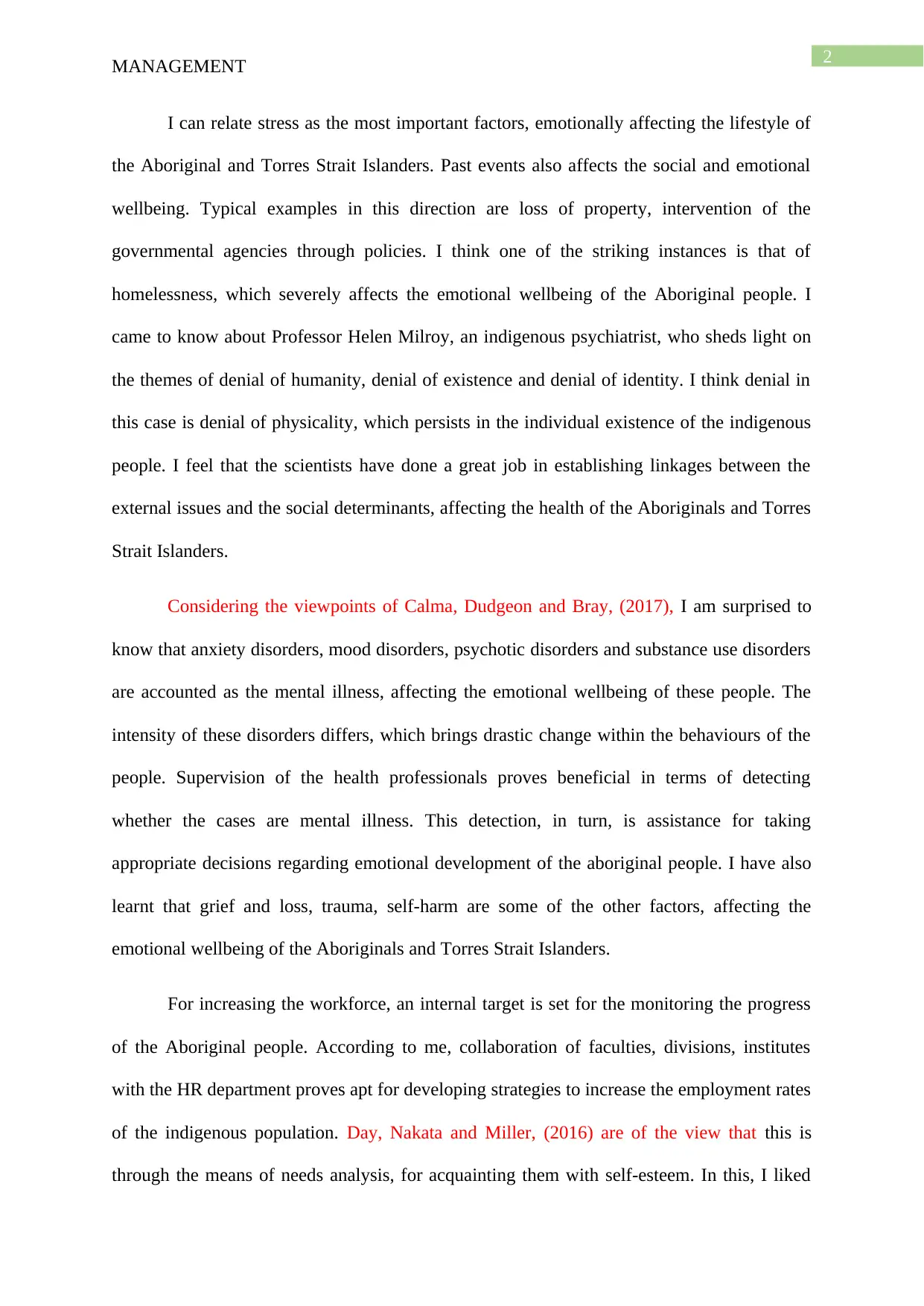
2
MANAGEMENT
I can relate stress as the most important factors, emotionally affecting the lifestyle of
the Aboriginal and Torres Strait Islanders. Past events also affects the social and emotional
wellbeing. Typical examples in this direction are loss of property, intervention of the
governmental agencies through policies. I think one of the striking instances is that of
homelessness, which severely affects the emotional wellbeing of the Aboriginal people. I
came to know about Professor Helen Milroy, an indigenous psychiatrist, who sheds light on
the themes of denial of humanity, denial of existence and denial of identity. I think denial in
this case is denial of physicality, which persists in the individual existence of the indigenous
people. I feel that the scientists have done a great job in establishing linkages between the
external issues and the social determinants, affecting the health of the Aboriginals and Torres
Strait Islanders.
Considering the viewpoints of Calma, Dudgeon and Bray, (2017), I am surprised to
know that anxiety disorders, mood disorders, psychotic disorders and substance use disorders
are accounted as the mental illness, affecting the emotional wellbeing of these people. The
intensity of these disorders differs, which brings drastic change within the behaviours of the
people. Supervision of the health professionals proves beneficial in terms of detecting
whether the cases are mental illness. This detection, in turn, is assistance for taking
appropriate decisions regarding emotional development of the aboriginal people. I have also
learnt that grief and loss, trauma, self-harm are some of the other factors, affecting the
emotional wellbeing of the Aboriginals and Torres Strait Islanders.
For increasing the workforce, an internal target is set for the monitoring the progress
of the Aboriginal people. According to me, collaboration of faculties, divisions, institutes
with the HR department proves apt for developing strategies to increase the employment rates
of the indigenous population. Day, Nakata and Miller, (2016) are of the view that this is
through the means of needs analysis, for acquainting them with self-esteem. In this, I liked
MANAGEMENT
I can relate stress as the most important factors, emotionally affecting the lifestyle of
the Aboriginal and Torres Strait Islanders. Past events also affects the social and emotional
wellbeing. Typical examples in this direction are loss of property, intervention of the
governmental agencies through policies. I think one of the striking instances is that of
homelessness, which severely affects the emotional wellbeing of the Aboriginal people. I
came to know about Professor Helen Milroy, an indigenous psychiatrist, who sheds light on
the themes of denial of humanity, denial of existence and denial of identity. I think denial in
this case is denial of physicality, which persists in the individual existence of the indigenous
people. I feel that the scientists have done a great job in establishing linkages between the
external issues and the social determinants, affecting the health of the Aboriginals and Torres
Strait Islanders.
Considering the viewpoints of Calma, Dudgeon and Bray, (2017), I am surprised to
know that anxiety disorders, mood disorders, psychotic disorders and substance use disorders
are accounted as the mental illness, affecting the emotional wellbeing of these people. The
intensity of these disorders differs, which brings drastic change within the behaviours of the
people. Supervision of the health professionals proves beneficial in terms of detecting
whether the cases are mental illness. This detection, in turn, is assistance for taking
appropriate decisions regarding emotional development of the aboriginal people. I have also
learnt that grief and loss, trauma, self-harm are some of the other factors, affecting the
emotional wellbeing of the Aboriginals and Torres Strait Islanders.
For increasing the workforce, an internal target is set for the monitoring the progress
of the Aboriginal people. According to me, collaboration of faculties, divisions, institutes
with the HR department proves apt for developing strategies to increase the employment rates
of the indigenous population. Day, Nakata and Miller, (2016) are of the view that this is
through the means of needs analysis, for acquainting them with self-esteem. In this, I liked
⊘ This is a preview!⊘
Do you want full access?
Subscribe today to unlock all pages.

Trusted by 1+ million students worldwide
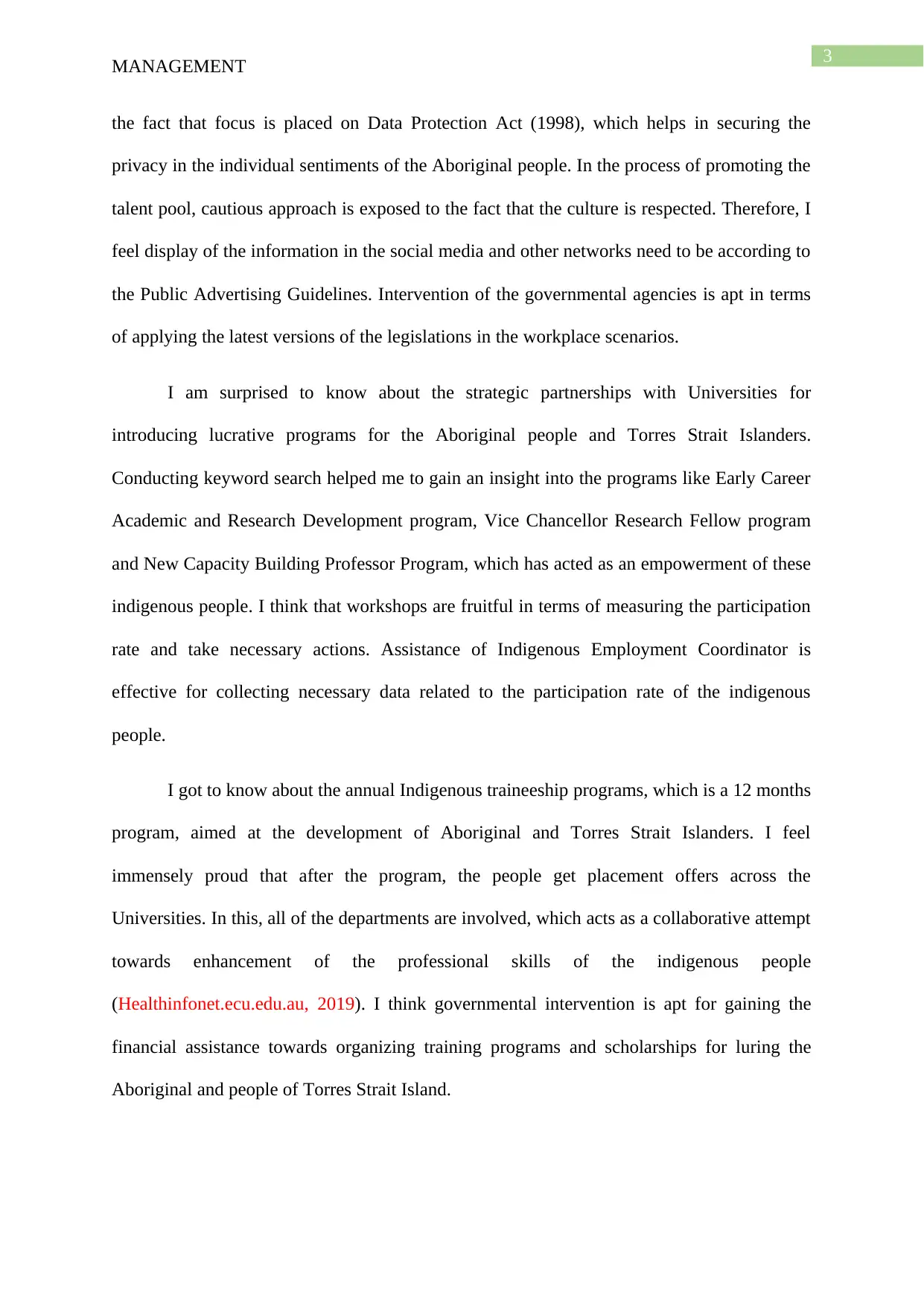
3
MANAGEMENT
the fact that focus is placed on Data Protection Act (1998), which helps in securing the
privacy in the individual sentiments of the Aboriginal people. In the process of promoting the
talent pool, cautious approach is exposed to the fact that the culture is respected. Therefore, I
feel display of the information in the social media and other networks need to be according to
the Public Advertising Guidelines. Intervention of the governmental agencies is apt in terms
of applying the latest versions of the legislations in the workplace scenarios.
I am surprised to know about the strategic partnerships with Universities for
introducing lucrative programs for the Aboriginal people and Torres Strait Islanders.
Conducting keyword search helped me to gain an insight into the programs like Early Career
Academic and Research Development program, Vice Chancellor Research Fellow program
and New Capacity Building Professor Program, which has acted as an empowerment of these
indigenous people. I think that workshops are fruitful in terms of measuring the participation
rate and take necessary actions. Assistance of Indigenous Employment Coordinator is
effective for collecting necessary data related to the participation rate of the indigenous
people.
I got to know about the annual Indigenous traineeship programs, which is a 12 months
program, aimed at the development of Aboriginal and Torres Strait Islanders. I feel
immensely proud that after the program, the people get placement offers across the
Universities. In this, all of the departments are involved, which acts as a collaborative attempt
towards enhancement of the professional skills of the indigenous people
(Healthinfonet.ecu.edu.au, 2019). I think governmental intervention is apt for gaining the
financial assistance towards organizing training programs and scholarships for luring the
Aboriginal and people of Torres Strait Island.
MANAGEMENT
the fact that focus is placed on Data Protection Act (1998), which helps in securing the
privacy in the individual sentiments of the Aboriginal people. In the process of promoting the
talent pool, cautious approach is exposed to the fact that the culture is respected. Therefore, I
feel display of the information in the social media and other networks need to be according to
the Public Advertising Guidelines. Intervention of the governmental agencies is apt in terms
of applying the latest versions of the legislations in the workplace scenarios.
I am surprised to know about the strategic partnerships with Universities for
introducing lucrative programs for the Aboriginal people and Torres Strait Islanders.
Conducting keyword search helped me to gain an insight into the programs like Early Career
Academic and Research Development program, Vice Chancellor Research Fellow program
and New Capacity Building Professor Program, which has acted as an empowerment of these
indigenous people. I think that workshops are fruitful in terms of measuring the participation
rate and take necessary actions. Assistance of Indigenous Employment Coordinator is
effective for collecting necessary data related to the participation rate of the indigenous
people.
I got to know about the annual Indigenous traineeship programs, which is a 12 months
program, aimed at the development of Aboriginal and Torres Strait Islanders. I feel
immensely proud that after the program, the people get placement offers across the
Universities. In this, all of the departments are involved, which acts as a collaborative attempt
towards enhancement of the professional skills of the indigenous people
(Healthinfonet.ecu.edu.au, 2019). I think governmental intervention is apt for gaining the
financial assistance towards organizing training programs and scholarships for luring the
Aboriginal and people of Torres Strait Island.
Paraphrase This Document
Need a fresh take? Get an instant paraphrase of this document with our AI Paraphraser
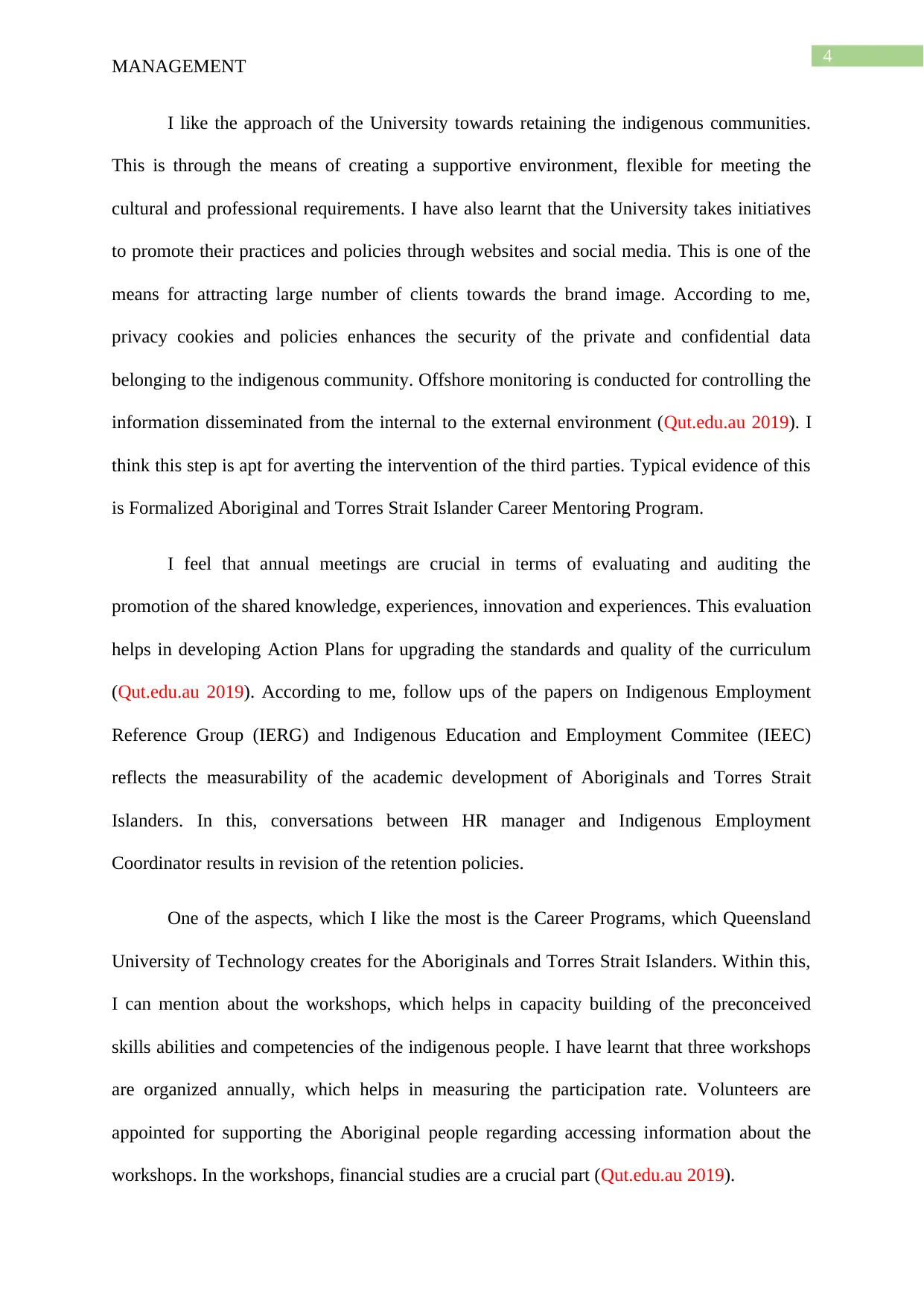
4
MANAGEMENT
I like the approach of the University towards retaining the indigenous communities.
This is through the means of creating a supportive environment, flexible for meeting the
cultural and professional requirements. I have also learnt that the University takes initiatives
to promote their practices and policies through websites and social media. This is one of the
means for attracting large number of clients towards the brand image. According to me,
privacy cookies and policies enhances the security of the private and confidential data
belonging to the indigenous community. Offshore monitoring is conducted for controlling the
information disseminated from the internal to the external environment (Qut.edu.au 2019). I
think this step is apt for averting the intervention of the third parties. Typical evidence of this
is Formalized Aboriginal and Torres Strait Islander Career Mentoring Program.
I feel that annual meetings are crucial in terms of evaluating and auditing the
promotion of the shared knowledge, experiences, innovation and experiences. This evaluation
helps in developing Action Plans for upgrading the standards and quality of the curriculum
(Qut.edu.au 2019). According to me, follow ups of the papers on Indigenous Employment
Reference Group (IERG) and Indigenous Education and Employment Commitee (IEEC)
reflects the measurability of the academic development of Aboriginals and Torres Strait
Islanders. In this, conversations between HR manager and Indigenous Employment
Coordinator results in revision of the retention policies.
One of the aspects, which I like the most is the Career Programs, which Queensland
University of Technology creates for the Aboriginals and Torres Strait Islanders. Within this,
I can mention about the workshops, which helps in capacity building of the preconceived
skills abilities and competencies of the indigenous people. I have learnt that three workshops
are organized annually, which helps in measuring the participation rate. Volunteers are
appointed for supporting the Aboriginal people regarding accessing information about the
workshops. In the workshops, financial studies are a crucial part (Qut.edu.au 2019).
MANAGEMENT
I like the approach of the University towards retaining the indigenous communities.
This is through the means of creating a supportive environment, flexible for meeting the
cultural and professional requirements. I have also learnt that the University takes initiatives
to promote their practices and policies through websites and social media. This is one of the
means for attracting large number of clients towards the brand image. According to me,
privacy cookies and policies enhances the security of the private and confidential data
belonging to the indigenous community. Offshore monitoring is conducted for controlling the
information disseminated from the internal to the external environment (Qut.edu.au 2019). I
think this step is apt for averting the intervention of the third parties. Typical evidence of this
is Formalized Aboriginal and Torres Strait Islander Career Mentoring Program.
I feel that annual meetings are crucial in terms of evaluating and auditing the
promotion of the shared knowledge, experiences, innovation and experiences. This evaluation
helps in developing Action Plans for upgrading the standards and quality of the curriculum
(Qut.edu.au 2019). According to me, follow ups of the papers on Indigenous Employment
Reference Group (IERG) and Indigenous Education and Employment Commitee (IEEC)
reflects the measurability of the academic development of Aboriginals and Torres Strait
Islanders. In this, conversations between HR manager and Indigenous Employment
Coordinator results in revision of the retention policies.
One of the aspects, which I like the most is the Career Programs, which Queensland
University of Technology creates for the Aboriginals and Torres Strait Islanders. Within this,
I can mention about the workshops, which helps in capacity building of the preconceived
skills abilities and competencies of the indigenous people. I have learnt that three workshops
are organized annually, which helps in measuring the participation rate. Volunteers are
appointed for supporting the Aboriginal people regarding accessing information about the
workshops. In the workshops, financial studies are a crucial part (Qut.edu.au 2019).
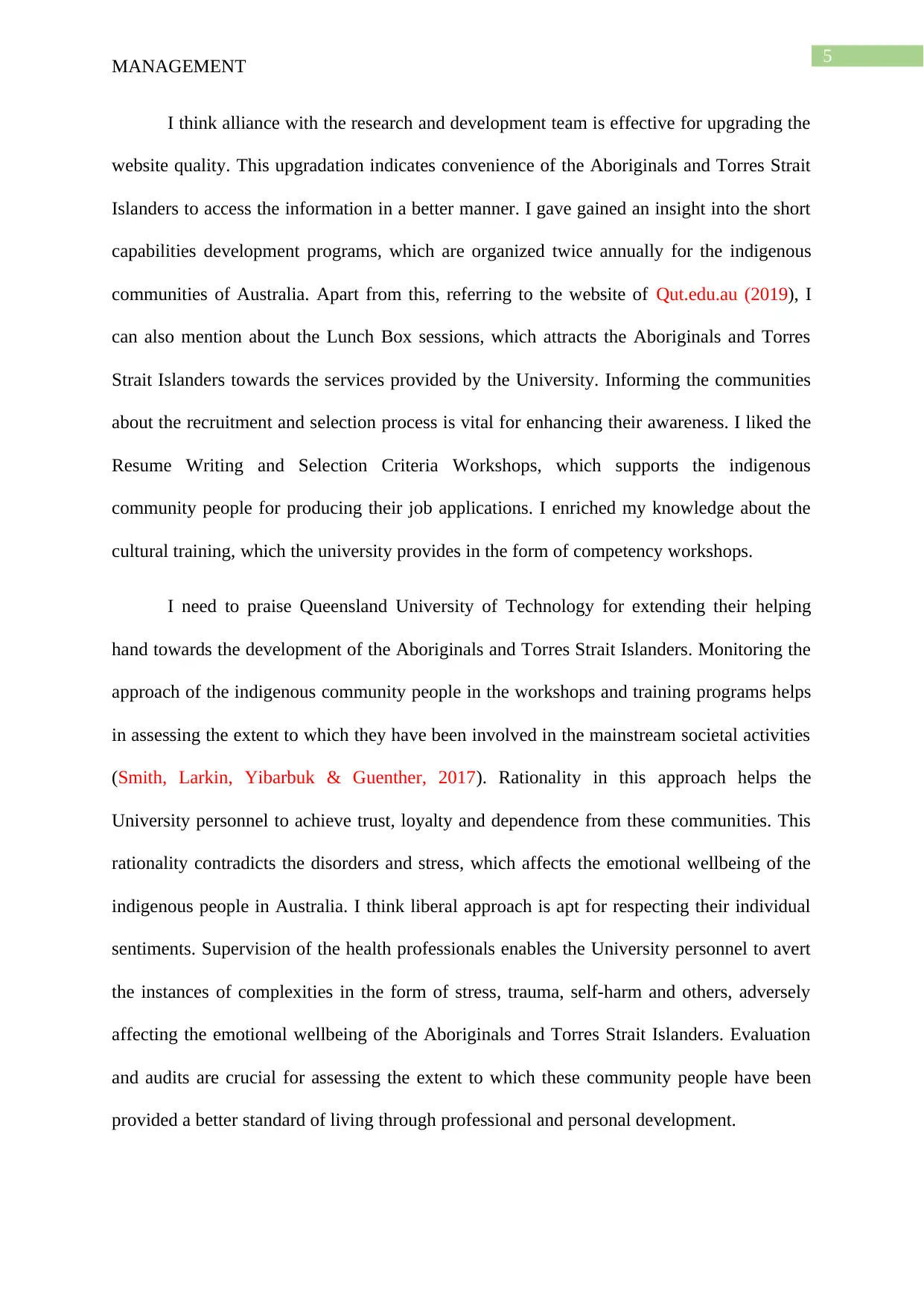
5
MANAGEMENT
I think alliance with the research and development team is effective for upgrading the
website quality. This upgradation indicates convenience of the Aboriginals and Torres Strait
Islanders to access the information in a better manner. I gave gained an insight into the short
capabilities development programs, which are organized twice annually for the indigenous
communities of Australia. Apart from this, referring to the website of Qut.edu.au (2019), I
can also mention about the Lunch Box sessions, which attracts the Aboriginals and Torres
Strait Islanders towards the services provided by the University. Informing the communities
about the recruitment and selection process is vital for enhancing their awareness. I liked the
Resume Writing and Selection Criteria Workshops, which supports the indigenous
community people for producing their job applications. I enriched my knowledge about the
cultural training, which the university provides in the form of competency workshops.
I need to praise Queensland University of Technology for extending their helping
hand towards the development of the Aboriginals and Torres Strait Islanders. Monitoring the
approach of the indigenous community people in the workshops and training programs helps
in assessing the extent to which they have been involved in the mainstream societal activities
(Smith, Larkin, Yibarbuk & Guenther, 2017). Rationality in this approach helps the
University personnel to achieve trust, loyalty and dependence from these communities. This
rationality contradicts the disorders and stress, which affects the emotional wellbeing of the
indigenous people in Australia. I think liberal approach is apt for respecting their individual
sentiments. Supervision of the health professionals enables the University personnel to avert
the instances of complexities in the form of stress, trauma, self-harm and others, adversely
affecting the emotional wellbeing of the Aboriginals and Torres Strait Islanders. Evaluation
and audits are crucial for assessing the extent to which these community people have been
provided a better standard of living through professional and personal development.
MANAGEMENT
I think alliance with the research and development team is effective for upgrading the
website quality. This upgradation indicates convenience of the Aboriginals and Torres Strait
Islanders to access the information in a better manner. I gave gained an insight into the short
capabilities development programs, which are organized twice annually for the indigenous
communities of Australia. Apart from this, referring to the website of Qut.edu.au (2019), I
can also mention about the Lunch Box sessions, which attracts the Aboriginals and Torres
Strait Islanders towards the services provided by the University. Informing the communities
about the recruitment and selection process is vital for enhancing their awareness. I liked the
Resume Writing and Selection Criteria Workshops, which supports the indigenous
community people for producing their job applications. I enriched my knowledge about the
cultural training, which the university provides in the form of competency workshops.
I need to praise Queensland University of Technology for extending their helping
hand towards the development of the Aboriginals and Torres Strait Islanders. Monitoring the
approach of the indigenous community people in the workshops and training programs helps
in assessing the extent to which they have been involved in the mainstream societal activities
(Smith, Larkin, Yibarbuk & Guenther, 2017). Rationality in this approach helps the
University personnel to achieve trust, loyalty and dependence from these communities. This
rationality contradicts the disorders and stress, which affects the emotional wellbeing of the
indigenous people in Australia. I think liberal approach is apt for respecting their individual
sentiments. Supervision of the health professionals enables the University personnel to avert
the instances of complexities in the form of stress, trauma, self-harm and others, adversely
affecting the emotional wellbeing of the Aboriginals and Torres Strait Islanders. Evaluation
and audits are crucial for assessing the extent to which these community people have been
provided a better standard of living through professional and personal development.
⊘ This is a preview!⊘
Do you want full access?
Subscribe today to unlock all pages.

Trusted by 1+ million students worldwide
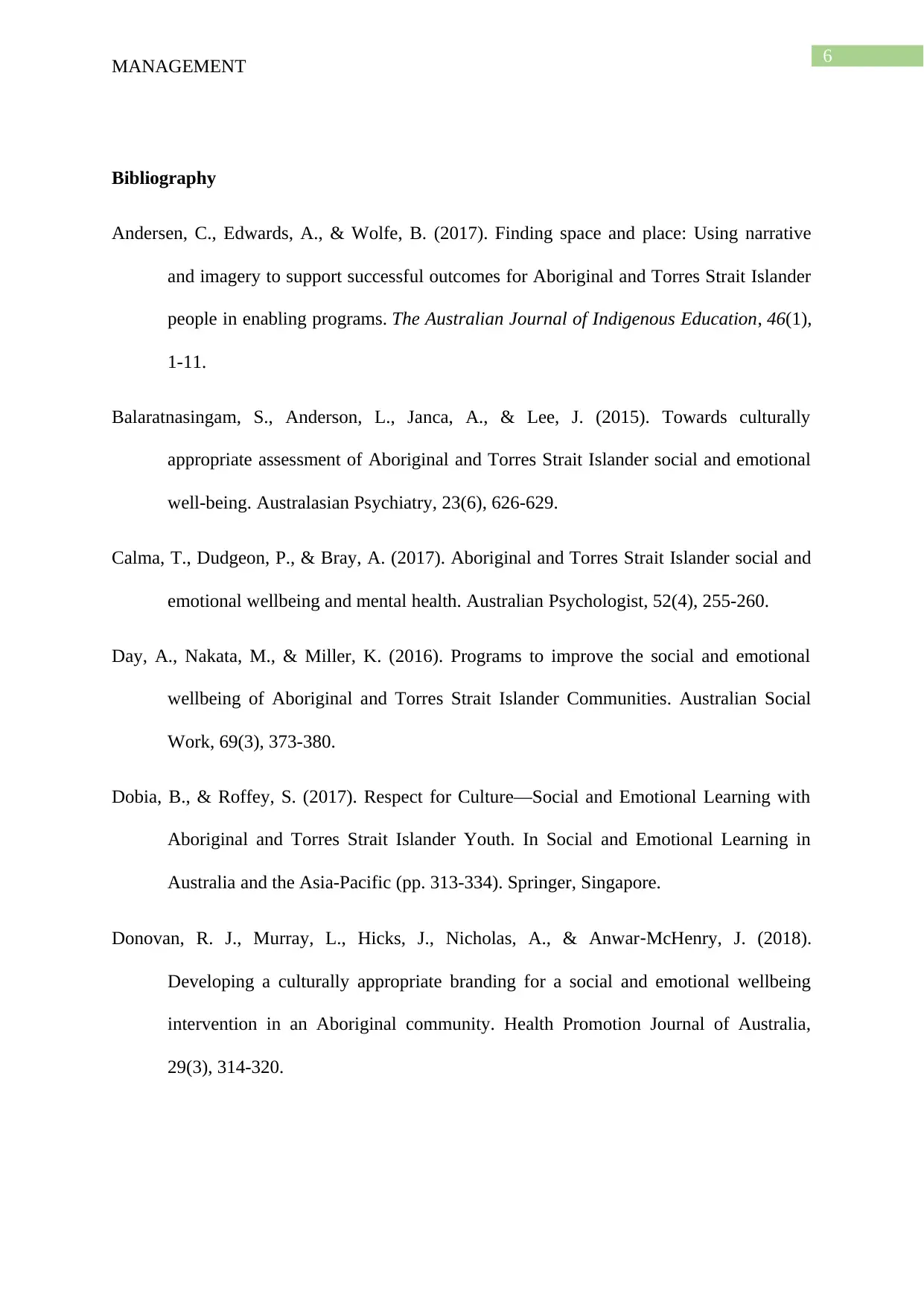
6
MANAGEMENT
Bibliography
Andersen, C., Edwards, A., & Wolfe, B. (2017). Finding space and place: Using narrative
and imagery to support successful outcomes for Aboriginal and Torres Strait Islander
people in enabling programs. The Australian Journal of Indigenous Education, 46(1),
1-11.
Balaratnasingam, S., Anderson, L., Janca, A., & Lee, J. (2015). Towards culturally
appropriate assessment of Aboriginal and Torres Strait Islander social and emotional
well-being. Australasian Psychiatry, 23(6), 626-629.
Calma, T., Dudgeon, P., & Bray, A. (2017). Aboriginal and Torres Strait Islander social and
emotional wellbeing and mental health. Australian Psychologist, 52(4), 255-260.
Day, A., Nakata, M., & Miller, K. (2016). Programs to improve the social and emotional
wellbeing of Aboriginal and Torres Strait Islander Communities. Australian Social
Work, 69(3), 373-380.
Dobia, B., & Roffey, S. (2017). Respect for Culture—Social and Emotional Learning with
Aboriginal and Torres Strait Islander Youth. In Social and Emotional Learning in
Australia and the Asia-Pacific (pp. 313-334). Springer, Singapore.
Donovan, R. J., Murray, L., Hicks, J., Nicholas, A., & Anwar‐McHenry, J. (2018).
Developing a culturally appropriate branding for a social and emotional wellbeing
intervention in an Aboriginal community. Health Promotion Journal of Australia,
29(3), 314-320.
MANAGEMENT
Bibliography
Andersen, C., Edwards, A., & Wolfe, B. (2017). Finding space and place: Using narrative
and imagery to support successful outcomes for Aboriginal and Torres Strait Islander
people in enabling programs. The Australian Journal of Indigenous Education, 46(1),
1-11.
Balaratnasingam, S., Anderson, L., Janca, A., & Lee, J. (2015). Towards culturally
appropriate assessment of Aboriginal and Torres Strait Islander social and emotional
well-being. Australasian Psychiatry, 23(6), 626-629.
Calma, T., Dudgeon, P., & Bray, A. (2017). Aboriginal and Torres Strait Islander social and
emotional wellbeing and mental health. Australian Psychologist, 52(4), 255-260.
Day, A., Nakata, M., & Miller, K. (2016). Programs to improve the social and emotional
wellbeing of Aboriginal and Torres Strait Islander Communities. Australian Social
Work, 69(3), 373-380.
Dobia, B., & Roffey, S. (2017). Respect for Culture—Social and Emotional Learning with
Aboriginal and Torres Strait Islander Youth. In Social and Emotional Learning in
Australia and the Asia-Pacific (pp. 313-334). Springer, Singapore.
Donovan, R. J., Murray, L., Hicks, J., Nicholas, A., & Anwar‐McHenry, J. (2018).
Developing a culturally appropriate branding for a social and emotional wellbeing
intervention in an Aboriginal community. Health Promotion Journal of Australia,
29(3), 314-320.
Paraphrase This Document
Need a fresh take? Get an instant paraphrase of this document with our AI Paraphraser
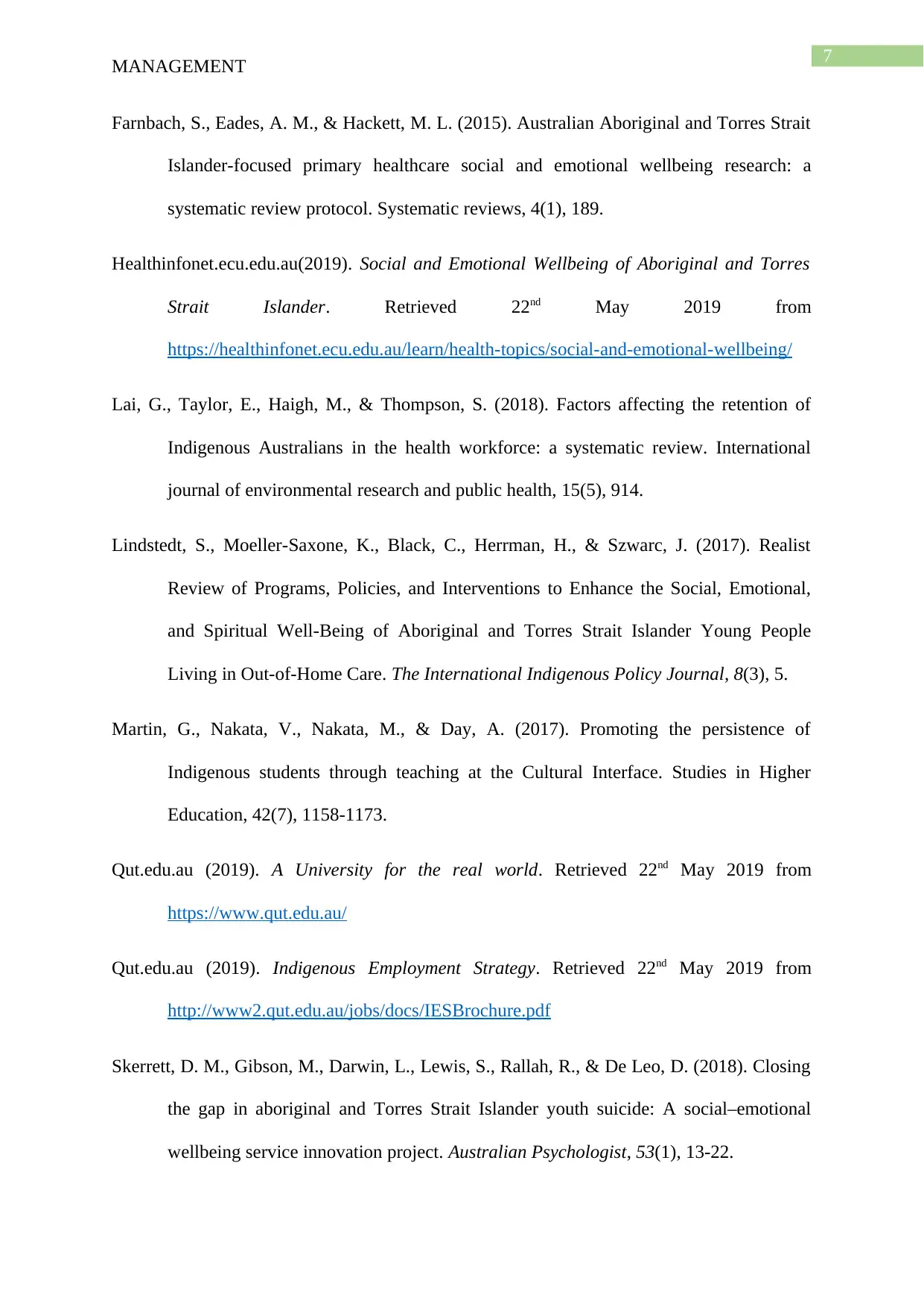
7
MANAGEMENT
Farnbach, S., Eades, A. M., & Hackett, M. L. (2015). Australian Aboriginal and Torres Strait
Islander-focused primary healthcare social and emotional wellbeing research: a
systematic review protocol. Systematic reviews, 4(1), 189.
Healthinfonet.ecu.edu.au(2019). Social and Emotional Wellbeing of Aboriginal and Torres
Strait Islander. Retrieved 22nd May 2019 from
https://healthinfonet.ecu.edu.au/learn/health-topics/social-and-emotional-wellbeing/
Lai, G., Taylor, E., Haigh, M., & Thompson, S. (2018). Factors affecting the retention of
Indigenous Australians in the health workforce: a systematic review. International
journal of environmental research and public health, 15(5), 914.
Lindstedt, S., Moeller-Saxone, K., Black, C., Herrman, H., & Szwarc, J. (2017). Realist
Review of Programs, Policies, and Interventions to Enhance the Social, Emotional,
and Spiritual Well-Being of Aboriginal and Torres Strait Islander Young People
Living in Out-of-Home Care. The International Indigenous Policy Journal, 8(3), 5.
Martin, G., Nakata, V., Nakata, M., & Day, A. (2017). Promoting the persistence of
Indigenous students through teaching at the Cultural Interface. Studies in Higher
Education, 42(7), 1158-1173.
Qut.edu.au (2019). A University for the real world. Retrieved 22nd May 2019 from
https://www.qut.edu.au/
Qut.edu.au (2019). Indigenous Employment Strategy. Retrieved 22nd May 2019 from
http://www2.qut.edu.au/jobs/docs/IESBrochure.pdf
Skerrett, D. M., Gibson, M., Darwin, L., Lewis, S., Rallah, R., & De Leo, D. (2018). Closing
the gap in aboriginal and Torres Strait Islander youth suicide: A social–emotional
wellbeing service innovation project. Australian Psychologist, 53(1), 13-22.
MANAGEMENT
Farnbach, S., Eades, A. M., & Hackett, M. L. (2015). Australian Aboriginal and Torres Strait
Islander-focused primary healthcare social and emotional wellbeing research: a
systematic review protocol. Systematic reviews, 4(1), 189.
Healthinfonet.ecu.edu.au(2019). Social and Emotional Wellbeing of Aboriginal and Torres
Strait Islander. Retrieved 22nd May 2019 from
https://healthinfonet.ecu.edu.au/learn/health-topics/social-and-emotional-wellbeing/
Lai, G., Taylor, E., Haigh, M., & Thompson, S. (2018). Factors affecting the retention of
Indigenous Australians in the health workforce: a systematic review. International
journal of environmental research and public health, 15(5), 914.
Lindstedt, S., Moeller-Saxone, K., Black, C., Herrman, H., & Szwarc, J. (2017). Realist
Review of Programs, Policies, and Interventions to Enhance the Social, Emotional,
and Spiritual Well-Being of Aboriginal and Torres Strait Islander Young People
Living in Out-of-Home Care. The International Indigenous Policy Journal, 8(3), 5.
Martin, G., Nakata, V., Nakata, M., & Day, A. (2017). Promoting the persistence of
Indigenous students through teaching at the Cultural Interface. Studies in Higher
Education, 42(7), 1158-1173.
Qut.edu.au (2019). A University for the real world. Retrieved 22nd May 2019 from
https://www.qut.edu.au/
Qut.edu.au (2019). Indigenous Employment Strategy. Retrieved 22nd May 2019 from
http://www2.qut.edu.au/jobs/docs/IESBrochure.pdf
Skerrett, D. M., Gibson, M., Darwin, L., Lewis, S., Rallah, R., & De Leo, D. (2018). Closing
the gap in aboriginal and Torres Strait Islander youth suicide: A social–emotional
wellbeing service innovation project. Australian Psychologist, 53(1), 13-22.
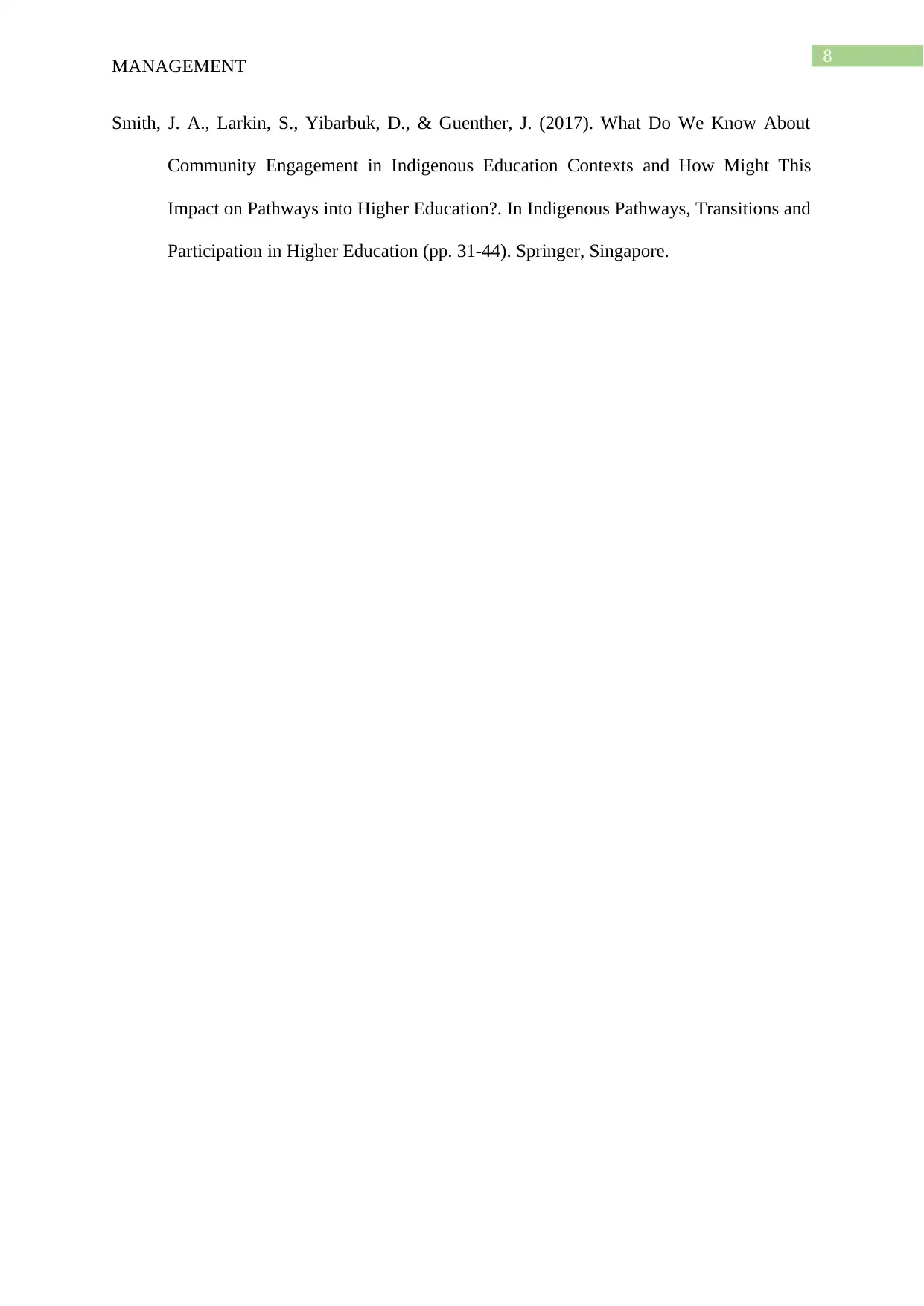
8
MANAGEMENT
Smith, J. A., Larkin, S., Yibarbuk, D., & Guenther, J. (2017). What Do We Know About
Community Engagement in Indigenous Education Contexts and How Might This
Impact on Pathways into Higher Education?. In Indigenous Pathways, Transitions and
Participation in Higher Education (pp. 31-44). Springer, Singapore.
MANAGEMENT
Smith, J. A., Larkin, S., Yibarbuk, D., & Guenther, J. (2017). What Do We Know About
Community Engagement in Indigenous Education Contexts and How Might This
Impact on Pathways into Higher Education?. In Indigenous Pathways, Transitions and
Participation in Higher Education (pp. 31-44). Springer, Singapore.
⊘ This is a preview!⊘
Do you want full access?
Subscribe today to unlock all pages.

Trusted by 1+ million students worldwide
1 out of 9
Related Documents
Your All-in-One AI-Powered Toolkit for Academic Success.
+13062052269
info@desklib.com
Available 24*7 on WhatsApp / Email
![[object Object]](/_next/static/media/star-bottom.7253800d.svg)
Unlock your academic potential
Copyright © 2020–2025 A2Z Services. All Rights Reserved. Developed and managed by ZUCOL.





